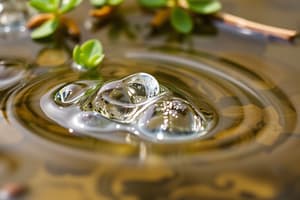Podcast
Questions and Answers
What property of water allows small objects to float on its surface?
What property of water allows small objects to float on its surface?
- Polarity
- Cohesion (correct)
- Adhesion
- Density Anomaly
Which property of water is primarily responsible for the high energy requirement to change its state from liquid to gas?
Which property of water is primarily responsible for the high energy requirement to change its state from liquid to gas?
- High Surface Tension
- Polarity
- High Heat of Vaporization (correct)
- High Specific Heat
What is the effect of water's density anomaly?
What is the effect of water's density anomaly?
- Water does not dissolve salts and sugars.
- Water has a pH of 14.
- Ice floats on water, insulating aquatic life. (correct)
- Water evaporates quickly at room temperature.
How does the polarity of water molecules affect its behavior as a solvent?
How does the polarity of water molecules affect its behavior as a solvent?
What property of water is crucial for temperature regulation in environments and living organisms?
What property of water is crucial for temperature regulation in environments and living organisms?
Flashcards are hidden until you start studying
Study Notes
Properties of Water
-
Polarity
- Water molecules have a polar arrangement of oxygen and hydrogen atoms (H2O).
- Creates a partial positive charge on hydrogen and a partial negative charge on oxygen.
-
Cohesion
- Water molecules stick to each other due to hydrogen bonding.
- Responsible for surface tension, allowing small objects to float on water.
-
Adhesion
- Water molecules can adhere to other substances.
- Causes capillary action, essential for water transport in plants.
-
High Specific Heat
- Water requires considerable energy to change its temperature.
- Helps regulate temperature in environments and living organisms.
-
High Heat of Vaporization
- A significant amount of energy is needed to convert water from liquid to gas.
- Provides a cooling effect through processes like sweating.
-
Density Anomaly
- Water is less dense as a solid (ice) than as a liquid.
- Ice floats on water, insulating aquatic life in frozen habitats.
-
Universal Solvent
- Water can dissolve many substances, including salts, sugars, acids, and gases.
- Facilitates biochemical reactions in living organisms.
-
pH Level
- Pure water has a pH of approximately 7 (neutral).
- Can act as an acid or base due to the presence of hydronium and hydroxide ions.
-
Hydrogen Bonding
- Strong intermolecular attractions between water molecules.
- Critical for the unique properties of water.
-
High Surface Tension
- Water's cohesive forces create a high surface tension, allowing it to form bubbles.
- Important for interactions with organisms (e.g., water striders).
These properties make water essential for life, affecting climate, weather patterns, and biological processes.
Water Polarity
- Water molecules are polar, meaning they have a positive and negative end. This is due to the uneven distribution of charge between the oxygen and hydrogen atoms.
- The oxygen atom has a partial negative charge, and the hydrogen atoms have a partial positive charge.
Cohesion
- Water molecules are attracted to each other through hydrogen bonds. This is called cohesion.
- This attraction causes high surface tension, allowing small objects to float on water.
Adhesion
- Water molecules can also bond to other substances. This is called adhesion.
- Adhesion and cohesion together contribute to capillary action, which is the ability of water to move up narrow tubes like plant stems.
High Specific Heat
- Water has a high specific heat, meaning it takes a lot of energy to raise its temperature. This helps regulate temperatures in the environment and keeps living organisms cool.
High Heat of Vaporization
- Water has a high heat of vaporization, meaning it requires a lot of energy to evaporate. This cooling effect is vital for processes like sweating.
Density Anomaly
- Water is less dense as a solid (ice) than as a liquid. This is why ice floats on water. This property helps insulate aquatic life in frozen habitats.
Universal Solvent
- Water can dissolve many substances, making it a universal solvent. This is essential for biochemical reactions in living organisms.
pH Level
- Pure water has a neutral pH of approximately 7.
- Water can act as an acid or base depending on the presence of hydronium (H3O+) and hydroxide (OH-) ions.
Hydrogen Bonding
- Hydrogen bonds are strong intermolecular attractions between water molecules. These bonds are responsible for many of water’s unique properties.
High Surface Tension
- The cohesive forces between water molecules create high surface tension. This allows water to form bubbles, and it's important for how aquatic organisms interact with water.
Studying That Suits You
Use AI to generate personalized quizzes and flashcards to suit your learning preferences.





